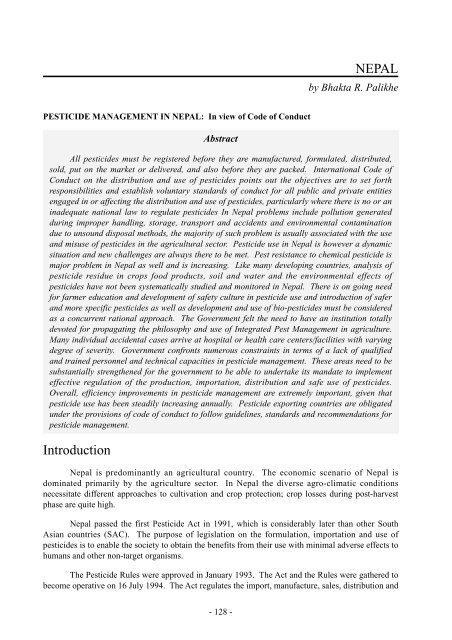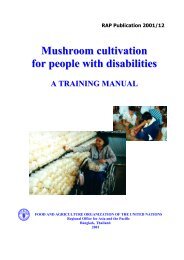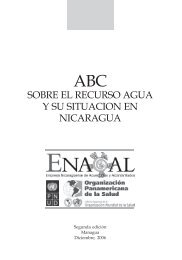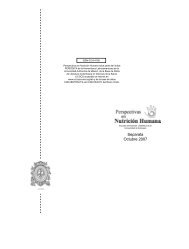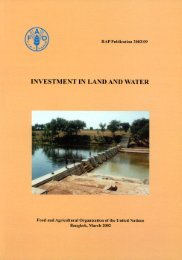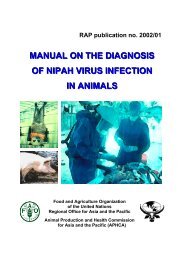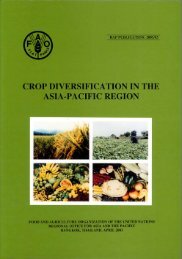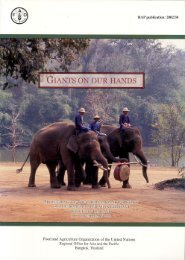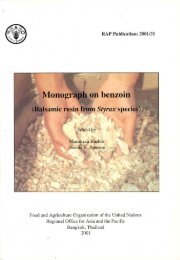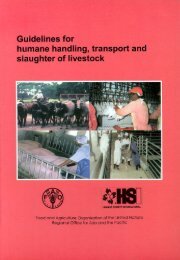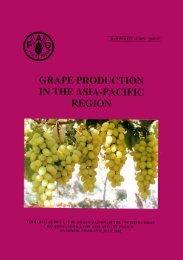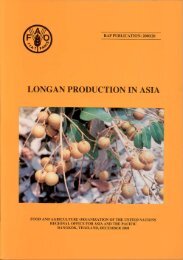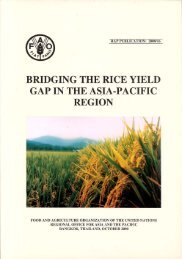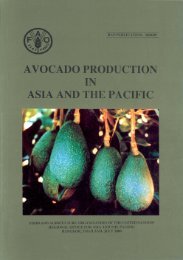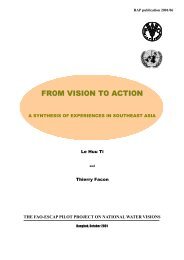Proceedings of the Asia regional workshop on the
Proceedings of the Asia regional workshop on the
Proceedings of the Asia regional workshop on the
Create successful ePaper yourself
Turn your PDF publications into a flip-book with our unique Google optimized e-Paper software.
PESTICIDE MANAGEMENT IN NEPAL: In view <str<strong>on</strong>g>of</str<strong>on</strong>g> Code <str<strong>on</strong>g>of</str<strong>on</strong>g> C<strong>on</strong>duct<br />
Abstract<br />
- 128 -<br />
NEPAL<br />
by Bhakta R. Palikhe<br />
All pesticides must be registered before <str<strong>on</strong>g>the</str<strong>on</strong>g>y are manufactured, formulated, distributed,<br />
sold, put <strong>on</strong> <str<strong>on</strong>g>the</str<strong>on</strong>g> market or delivered, and also before <str<strong>on</strong>g>the</str<strong>on</strong>g>y are packed. Internati<strong>on</strong>al Code <str<strong>on</strong>g>of</str<strong>on</strong>g><br />
C<strong>on</strong>duct <strong>on</strong> <str<strong>on</strong>g>the</str<strong>on</strong>g> distributi<strong>on</strong> and use <str<strong>on</strong>g>of</str<strong>on</strong>g> pesticides points out <str<strong>on</strong>g>the</str<strong>on</strong>g> objectives are to set forth<br />
resp<strong>on</strong>sibilities and establish voluntary standards <str<strong>on</strong>g>of</str<strong>on</strong>g> c<strong>on</strong>duct for all public and private entities<br />
engaged in or affecting <str<strong>on</strong>g>the</str<strong>on</strong>g> distributi<strong>on</strong> and use <str<strong>on</strong>g>of</str<strong>on</strong>g> pesticides, particularly where <str<strong>on</strong>g>the</str<strong>on</strong>g>re is no or an<br />
inadequate nati<strong>on</strong>al law to regulate pesticides In Nepal problems include polluti<strong>on</strong> generated<br />
during improper handling, storage, transport and accidents and envir<strong>on</strong>mental c<strong>on</strong>taminati<strong>on</strong><br />
due to unsound disposal methods, <str<strong>on</strong>g>the</str<strong>on</strong>g> majority <str<strong>on</strong>g>of</str<strong>on</strong>g> such problem is usually associated with <str<strong>on</strong>g>the</str<strong>on</strong>g> use<br />
and misuse <str<strong>on</strong>g>of</str<strong>on</strong>g> pesticides in <str<strong>on</strong>g>the</str<strong>on</strong>g> agricultural sector. Pesticide use in Nepal is however a dynamic<br />
situati<strong>on</strong> and new challenges are always <str<strong>on</strong>g>the</str<strong>on</strong>g>re to be met. Pest resistance to chemical pesticide is<br />
major problem in Nepal as well and is increasing. Like many developing countries, analysis <str<strong>on</strong>g>of</str<strong>on</strong>g><br />
pesticide residue in crops food products, soil and water and <str<strong>on</strong>g>the</str<strong>on</strong>g> envir<strong>on</strong>mental effects <str<strong>on</strong>g>of</str<strong>on</strong>g><br />
pesticides have not been systematically studied and m<strong>on</strong>itored in Nepal. There is <strong>on</strong> going need<br />
for farmer educati<strong>on</strong> and development <str<strong>on</strong>g>of</str<strong>on</strong>g> safety culture in pesticide use and introducti<strong>on</strong> <str<strong>on</strong>g>of</str<strong>on</strong>g> safer<br />
and more specific pesticides as well as development and use <str<strong>on</strong>g>of</str<strong>on</strong>g> bio-pesticides must be c<strong>on</strong>sidered<br />
as a c<strong>on</strong>current rati<strong>on</strong>al approach. The Government felt <str<strong>on</strong>g>the</str<strong>on</strong>g> need to have an instituti<strong>on</strong> totally<br />
devoted for propagating <str<strong>on</strong>g>the</str<strong>on</strong>g> philosophy and use <str<strong>on</strong>g>of</str<strong>on</strong>g> Integrated Pest Management in agriculture.<br />
Many individual accidental cases arrive at hospital or health care centers/facilities with varying<br />
degree <str<strong>on</strong>g>of</str<strong>on</strong>g> severity. Government c<strong>on</strong>fr<strong>on</strong>ts numerous c<strong>on</strong>straints in terms <str<strong>on</strong>g>of</str<strong>on</strong>g> a lack <str<strong>on</strong>g>of</str<strong>on</strong>g> qualified<br />
and trained pers<strong>on</strong>nel and technical capacities in pesticide management. These areas need to be<br />
substantially streng<str<strong>on</strong>g>the</str<strong>on</strong>g>ned for <str<strong>on</strong>g>the</str<strong>on</strong>g> government to be able to undertake its mandate to implement<br />
effective regulati<strong>on</strong> <str<strong>on</strong>g>of</str<strong>on</strong>g> <str<strong>on</strong>g>the</str<strong>on</strong>g> producti<strong>on</strong>, importati<strong>on</strong>, distributi<strong>on</strong> and safe use <str<strong>on</strong>g>of</str<strong>on</strong>g> pesticides.<br />
Overall, efficiency improvements in pesticide management are extremely important, given that<br />
pesticide use has been steadily increasing annually. Pesticide exporting countries are obligated<br />
under <str<strong>on</strong>g>the</str<strong>on</strong>g> provisi<strong>on</strong>s <str<strong>on</strong>g>of</str<strong>on</strong>g> code <str<strong>on</strong>g>of</str<strong>on</strong>g> c<strong>on</strong>duct to follow guidelines, standards and recommendati<strong>on</strong>s for<br />
pesticide management.<br />
Introducti<strong>on</strong><br />
Nepal is predominantly an agricultural country. The ec<strong>on</strong>omic scenario <str<strong>on</strong>g>of</str<strong>on</strong>g> Nepal is<br />
dominated primarily by <str<strong>on</strong>g>the</str<strong>on</strong>g> agriculture sector. In Nepal <str<strong>on</strong>g>the</str<strong>on</strong>g> diverse agro-climatic c<strong>on</strong>diti<strong>on</strong>s<br />
necessitate different approaches to cultivati<strong>on</strong> and crop protecti<strong>on</strong>; crop losses during post-harvest<br />
phase are quite high.<br />
Nepal passed <str<strong>on</strong>g>the</str<strong>on</strong>g> first Pesticide Act in 1991, which is c<strong>on</strong>siderably later than o<str<strong>on</strong>g>the</str<strong>on</strong>g>r South<br />
<str<strong>on</strong>g>Asia</str<strong>on</strong>g>n countries (SAC). The purpose <str<strong>on</strong>g>of</str<strong>on</strong>g> legislati<strong>on</strong> <strong>on</strong> <str<strong>on</strong>g>the</str<strong>on</strong>g> formulati<strong>on</strong>, importati<strong>on</strong> and use <str<strong>on</strong>g>of</str<strong>on</strong>g><br />
pesticides is to enable <str<strong>on</strong>g>the</str<strong>on</strong>g> society to obtain <str<strong>on</strong>g>the</str<strong>on</strong>g> benefits from <str<strong>on</strong>g>the</str<strong>on</strong>g>ir use with minimal adverse effects to<br />
humans and o<str<strong>on</strong>g>the</str<strong>on</strong>g>r n<strong>on</strong>-target organisms.<br />
The Pesticide Rules were approved in January 1993. The Act and <str<strong>on</strong>g>the</str<strong>on</strong>g> Rules were ga<str<strong>on</strong>g>the</str<strong>on</strong>g>red to<br />
become operative <strong>on</strong> 16 July 1994. The Act regulates <str<strong>on</strong>g>the</str<strong>on</strong>g> import, manufacture, sales, distributi<strong>on</strong> and


